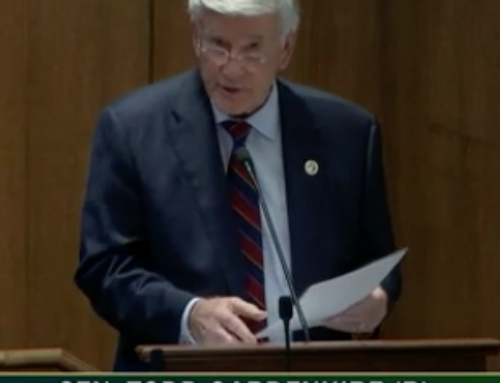Commercial Appeal reports possible open meetings violations by a charter school
The Commercial Appeal reports today on possible open meetings violations by a charter school, the Memphis Academy of Health Sciences.
The potential violations came during two meetings, one in which the charter school board voted to make board chairman Derrick Joyce the interim executive director.
Board member Dionysia Smith-Richardson told The Commercial Appeal that there was not public notice of the two board meetings in January, including one called as a special emergency board meeting, and they were not held in compliance with the Tennessee Open Meetings Act. Public charter schools by law are subject to the Tennessee Open Meetings Act, which requires adequate public notice of meetings.
Smith-Richardson also told The Commercial Appeal that the board has not met to discuss or decide Joyce’s pay though he has already begun work.
Following is the Commercial Appeal’s story, reported by Jane Roberts:
The Memphis Academy of Health Sciences, in transition after longtime director Curtis Weathers resigned this winter, held two illegal meetings this winter, according to a board member.
By state law, charter school boards must give advance public notice of board meetings and meet in public.
In a meeting Jan. 23, the MAHS board voted to make longtime board chairman Derrick Joyce interim executive director. He nominated himself in the meeting held via conference call.
The board’s transition committee also met in an “emergency” meeting Jan. 16. The public was not notified of either meeting.
“The realities are we do not have an executive director,” said new board chairman Corey Johnson. “We have an interim person who is helping right the ship. Rev. Joyce is the perfect person for that, having served as board chairman and working closely with Mr. Weathers. It just made sense because he was most versed in the area. That’s really the logic behind it all.”
While Joyce has been on the job since Feb. 3, board member Dionysia Richardson-Smith said the board has not met to discuss his pay or the terms of his work.
“I know he is being paid,” she said. “We were supposed to have a follow-up meeting immediately. We have e-mails saying he (chairman Corey Johnson) is working on the pay agreement, but we, as a board, have not voted on anything.”
She also says that she nominated another person, hoping to have a discussion about the skills the board wanted in an interim director. “There was no discussion. We didn’t even see resumes.”
MAHS, run by 100 Black Men of Memphis, is among the oldest charter schools in the city. It was established in 2003, the year after the Tennessee legislature established charter law. It has about 400 students in middle and high school.
Weathers, a former NFL player, had been executive director from the start. Under his leadership, MAHS was one of 22 former city schools recognized last year for academic achievement by the state Department of Education.
In January, Weathers announced he was leaving to become principal of Hamilton High School. His last day was Feb. 15.
“I think any time any organization goes through a transition, there are things that fall through the cracks,” Johnson said. “When you follow someone like Mr. Weathers, who had institutional capital, the rest of us are just trying to catch up. Our website is behind and not up-to-date. At our next board meeting, we will right the ship and be getting all our ducks in a row.”
He said Joyce’s pay was “benchmarked across the standard” for interim executives. “We want to make sure that he is appropriately paid for the responsibility he is assigned, that is if appropriately handled.”
Elisha Hodge, open meeting counsel to the state comptroller of the treasury, says business conducted in an illegal meeting can be voided if the governing body is sued. “A court could void action that was taken,” she said.
Charter schools in Tennessee are public schools approved by the local school board, which has responsibility for monitoring their academic progress and financial condition. Most have 10-year contracts.
“We typically monitor them every couple of months,” said Charisse Sales, SCS charter school coordinator. “There are just a handful of schools that have issues. It’s not pervasive.”
Besides posting notice of public meetings and board policies, charters are required to list names and contact information for board members.
“It is not sufficient to say send all e-mails here and we will sort it out,” Sales said. “That would be intimidating to constituents who feel they want to talk directly to board members.”
Minutes from the Jan. 23 meeting, provided to The Commercial Appeal by Richardson-Smith, show she tried several times to stop the board from voting on the interim executive director by saying the board was not in compliance.
In the minutes, Johnson tells the board that Richardson-Smith is misrepresenting open meeting laws and MAHS’s bylaws.
Johnson says the minutes are unofficial because they have not been approved.
Richardson-Smith, who has served on the MAHS board since 2009-2010, said the board’s meeting schedule is erratic.
“We were supposed to meet monthly, but we went to bimonthly. Then all of a sudden, we were on a quarterly schedule and the board never voted to change,” she said. Last month, on her way to the March meeting, she received a text from the board secretary telling her the meeting was canceled.
Johnson said he canceled the meeting to avoid further open meeting problems.
If the board wants to revisit Derrick’s role as interim executive director at its April meeting, “We’ll be on it. It will be a topic of discussion,” he said.




